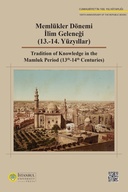Explore

Memlükler Dönemi İlim Geleneği (13.-14. Yüzyıllar) / Tradition of Knowledge in the Mamluk Period (13th-14th Centuries)
0 Ungluers have
Faved this Work
Login to Fave
The Mamluks (648-923/1250-1517), who ruled Egypt, Syria, and the Hijaz region, are considered to be one of the most important Muslim-Turkish states in Islamic history because they put an end to the Crusader threat in Syria and stopped the westward advance of the Mongols (Ilkhanids) who had destroyed the eastern part of the Islamic world. The Mamluks’ establishment of security and stability in their lands enabled the ulama, who were affected by the political turmoil in Andalusia and Anatolia, as well as central Iraq and Iran in the early 7th/13th century, to turn to the Egyptian-Sham region. In addition to the political stability they created, the Mamluks built many scientific institutions in cities such as Cairo, Damascus, Aleppo, and Jerusalem. They provided wide opportunities to scholars, making these cities the most important centers of knowledge. The rich scholarly environment in Egypt and Damascus, which attracted many scholars from various parts of the Islamic world, paved the way for the writing of many works in almost every field of Islamic sciences and the emergence of new and voluminous encyclopedic genres. Thus, an enormous amount of literature was created in fiqh, hadith, tafsīr, kalām, mysticism, philosophy, logic, qirāʾa, sīra, history, and tabāqat.
The understanding and interpretation of this literature, which is the result of an unprecedented scholarly effort in Islamic history, requires the contribution of many researchers in different fields. As a result of this need, interest in the scholarly and cultural accumulation of the Mamluk period is increasing both in international academic circles and in our country. Although the number and quality of studies on the political history of the Mamluks are not yet at the desired level, some studies have been conducted in the Turkish literature. However, research on the ulama, scientific institutions, types of works, and the status of Islamic sciences during the Mamluk period is still in its infancy. To overcome this deficiency to some extent, the Institute of Islamic Studies at Istanbul University (then known as the Center for Islamic Studies at Istanbul University) organized a workshop titled Islamic Sciences in the Mamluk Period on 19-20 September 2019. Thus, it was aimed to evaluate the status of the studies on the ulama and Islamic sciences related to the Mamluk period, to propose new research topics in the areas of need, to ensure cooperation among those interested in this field, and to create a basis for future studies. At the end of this workshop, the need to organize an international meeting with wide participation in the scholarly tradition in the Mamluk period was expressed. For this purpose, an international symposium titled The Tradition of Knowledge in the Mamluk Period-I (13th and 14th Centuries) was organized on September 28-29, 2021, hosted by Istanbul University in cooperation with the Institute of Islamic Studies at Istanbul University and the Foundation for Research in Islamic Sciences (ISAV). In the symposium, many researchers made presentations on tafsīr, hadith, fiqh, historiography, philosophy, kalām, mysticism, culture-literature, ulama, and scientific institutions.
This book was formed by revising some of the papers presented at the symposium during the publication phase. The full text of the relevant papers has been reviewed and turned into articles. The thematically re-planned book consists of seven chapters: Qurʾānic Sciences and Tafsīr, Fiqh Thought and Literature, Hanafi Fiqh and Hadith Studies, Kalām, History and Sīra Writing, Language and Literature, Scientific Institutions and Ulama. We would like to take this opportunity to express our gratitude to Prof. Dr. Mahmut Ak, Rector of Istanbul University, and Prof. Dr. Salih Tuğ, Chairman of the Board of Trustees of ISAV, for their support during the organization of the symposium.
This book is included in DOAB.
Why read this book? Have your say.
You must be logged in to comment.
Rights Information
Are you the author or publisher of this work? If so, you can claim it as yours by registering as an Unglue.it rights holder.Downloads
This work has been downloaded 15 times via unglue.it ebook links.
- 15 - pdf (CC BY-NC) at Unglue.it.
Keywords
- History
- Humanities
- Religion & beliefs
- Religion: general
Links
DOI: 10.26650/B/AA07AA25.2023.010Editions

